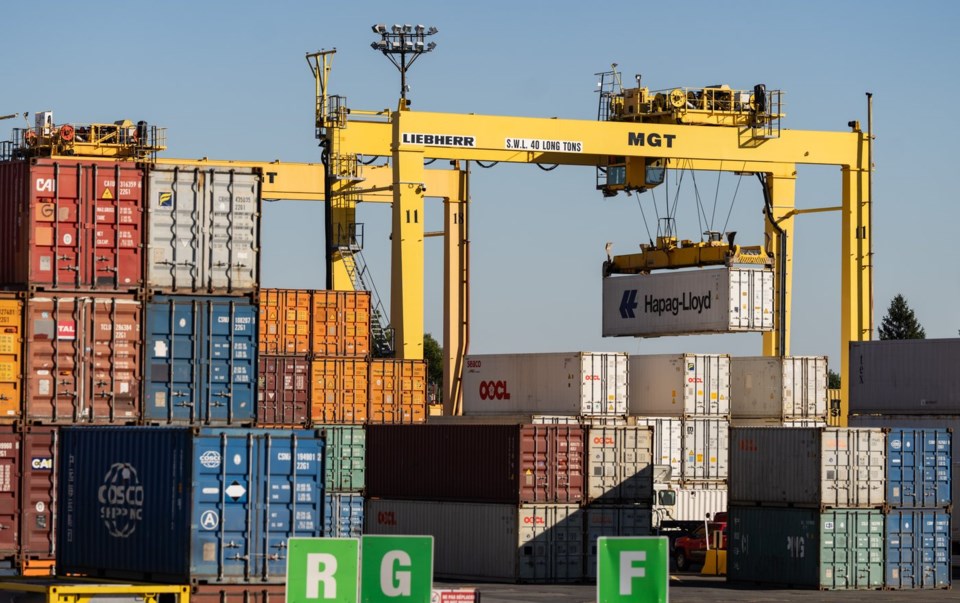MONTREAL — A new online portal for collecting taxes on goods shipped into saąúĽĘ´«Ă˝ is creating headaches ahead of its rollout this week, importers say, with potential ripple effects for consumers.
The federal government's digital platform for paying duties is set to come online Monday in an effort to streamline the old, paper-based process that customs officials relied on for decades.
The new platform is known as the saąúĽĘ´«Ă˝ Border Services Agency Assessment Revenue Management project, or CARM.
The CBSA says the portal will smooth out cross-border transport by offering tens of thousands of shippers direct access to their information and a user-friendly platform for submitting documents while shoring up enforcement. But early feedback suggests the transition isn't going smoothly for all.
Many of the complaints revolve around registration, while others relate to navigating the platform itself, which will be used to collect some $40 billion in annual revenue.
"I've had to hire multiple staff to handle CARM onboarding, and then once they're onboarded how to navigate explanations on how to make payments," said Lisa McEwan, co-owner of customs brokerage firm Hemisphere Freight.
The confusion swirls around issues ranging from business numbers to customs bonds to misaligned billing cycles. If information submitted to create an account or process a transaction fails to match up perfectly with info held by the saąúĽĘ´«Ă˝ Revenue Agency, the user cannot register or go through with the shipment, she said.
"Sometimes the CRA even has a different address — they'll have unit 68 but really you're unit 69, and that doesn't allow you to onboard the portal," said McEwan, whose clients haul products ranging from carpets to kitchenware.
"Then you have to call the CARM hotline. At one point you were getting a ticket and it was about a four-week window before they would even get in touch with you."
Federal employees seemed "overwhelmed," she added.
"CARM is replacing several aging systems currently in use at the CBSA in order to improve compliance with trade rules, reduce lost revenue and simplify the import process," said agency Guillaume Bérubé in an emailed statement.
"This important milestone follows broad consultation with stakeholders and extensive system testing to ensure a smooth transition from outdated to modern systems."
Nonetheless, the hurdles of the new direct-reporting system may lead to backlogs in the short term.
"There's going to be some delays. And any time there's delays in trade, then there's usually costs associated. And those costs are passed on to the consumer," said Dave Pentland, vice-president of Carson International, a licensed customs broker based in Vancouver.
Others claim some importers may scrap Canadian shipments entirely.
"I've had clients who are in the U.S. and they're like, 'You know what, I don't have time,'" said McEwan. "So there could be less products available because of all these hoops you have to go through."
Some 99,300 shippers were registered to use the portal as of Oct. 14, the CBSA said. However, the number of Canadian import outfits stood at 163,881 last year, according to Statistics saąúĽĘ´«Ă˝, suggesting that tens of thousands of domestic importers have yet to sign up — never mind businesses based abroad.
The registrations follow a so-called soft launch one year ago intended to allow some importers to test their internal systems and work out software kinks, the government said.
Many shippers support the overhaul for its goal of efficiency and access, especially larger players that have the resources to stickhandle through bureaucratic obstacles.
"The less paper you use, the better. It's one of those things where the small guys are going to push back, the big guys are going to be on board," said John Corey, president of the Freight Management Association of saąúĽĘ´«Ă˝, whose members include manufacturers as well as retailers such as Canadian Tire and Home Depot.
The road to the launch pad has been long and bumpy. Between 2018 and 2022, the CBSA said it conducted 35 consultation sessions, 60-plus technical working group sessions and about 170 engagement events with importers, brokers, banks and warehouse operators.
The agency has already pushed back the start date once by six months.
But the benefits of a system that catches misclassifications could be fruitful. After analyzing 31 months of transactions starting in 2022, the CBSA projects that the portal could prevent importers from incorrectly claiming as much as $216 million annually in tax exemptions.
If so, the cost of the new platform by Deloitte, to which the undertaking was outsourced, could be worth the $182 million the government has paid the consulting firm so far.
"There are tens of millions of dollars of benefits and there's also a burden reduction for Canadian business," said CBSA vice-president Ted Gallivan during a House of Commons trade committee hearing on March 19.
In 2017, the auditor general recommended the agency step up enforcement and review its licensing regime for customs brokers after it found that shippers misclassified imported goods more than 20 percent of the time, depriving Ottawa of duty revenues.
"I have seen the positive impact of what it will bring," said McEwan of the new portal. "But the challenge is getting there."
This report by The Canadian Press was first published Oct. 20, 2024.
Christopher Reynolds, The Canadian Press



